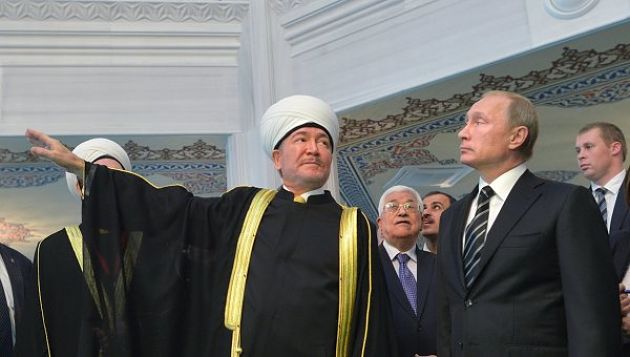Ravil Gainutdin, the head of the Council of Muftis of Russia and the Spiritual Administration of Muslims of Russia, was received by Kremlin owner Vladimir Putin on the occasion of the Eid al-Fitr holiday. It should be noted that this news was almost sensational. Ravil-hazrat has long been in disgrace with the Kremlin, and in recent years not only has he not been invited to meet with Putin, but he rarely sits in the second row next to the hierarchs of the Russian Orthodox Church, such as Albir Krganov or Ismail Berdiev. It is possible that he is offered to sit next to them, but the ambitions of the “spiritual leader of Russian Muslims” do not allow him to accept this offer.
In any case, the invitation of Gainutdin to the Kremlin after a long break is a new turn. What does it mean? In such situations there are always two approaches: the first is to look for some deep meaning in such actions of the Kremlin, the second is not to overestimate their significance until real actions follow, and to take into account the element of chance and administrative chaos. But if the Kremlin suddenly wanted to see Gainutdin again, who was distant from it due to his reputation as a “frondeur” compared to absolute puppets like Tadzhuddin, Krganov, Berdiev, etc., then why now? The version that comes to mind is that against the backdrop of growing protest activity in the country, the Kremlin decided to bring Gainutdin, as the most unpredictable, closer to them and thus prevent him in the Muslim segment of society.
Judging by the way this meeting was presented to the public by the press services of the Spiritual Administration of Muslims of Russia and the Council of Muftis of Russia, Gainutdin supported the Kremlin’s initiative. Thus, the description of the meeting was limited to general protocol phrases such as: “Mufti Gainutdin informed President Putin about the projects of the Spiritual Administration of Muslims of the Russian Federation and the Council of Muftis of Russia aimed at the intellectual, social and institutional development of Russian Islam and the implementation of a strategy of spiritual diplomacy in the international arena. The interlocutors confirmed the relevance of the previously set goals for the socialization of Muslims and the revival of the domestic school of Islamic theology”. It is important to note that Gainutdin, who has recently criticized the state’s Islamophobia, did not use this opportunity to convey his critical thoughts directly to those responsible for this policy. At least, this was not done publicly, and therefore it is not a political fact, because in politics what is fixed in public matters, not the non-binding “tea talks”.
But what is this agenda? Informatively, in this sense, an interview he gave to the Kazan newspaper Business Online is significant, in which he said, among other things, the following “If Islam in Russia were represented by a unified, centralized structure, there would be a unified policy and position on all issues. Even the state would find it easier to interact with such a structure and (reasonably speaking) pursue a reasonable state policy toward the Muslim population. But there are forces that oppose this. Why? In the post-Soviet period, there was a spiritual revival in the wake of democratization. When we build a democratic state, it gives us the right to freedom of conscience, speech and religion. But democracy is not anarchy. Islam is democracy, but there are commandments, laws, requirements in Islam – so be kind and follow them. But we have been told that since it is democracy, let them create whatever structures they want. Who benefits from that? Other people. There is no coherence, so they can say: “You raise this issue, but there is another activist who is silent or disagrees and has a different opinion. It can be said with certainty that building a strict vertical structure is in the long-term strategic interests of Russian Muslims – and of the Russian state as a whole. But today we see that many do not want to build a strict vertical in Islam.
So what does Ravil-hazrat want from the Kremlin? To centralize under him his Spiritual Administration of Muslims of Russia and the Council of Muftis of Russia? But this will not happen, and he must understand this. The maximum that can be achieved is for the Spiritual Administration of Muslims to be “heard” again, as it was in the “good old days” when its leader had the opportunity to use it to get certain things from the authorities. However, compared to the times of a decade or more ago, the situation has long since changed, although it is possible that the Spiritual Administration of Muslims of Russia has not realized this. The Kremlin and the regime it has created in the country have changed, as have the sentiments they have generated – among Muslims and non-Muslims alike.
What Muslims need today is not a unified and centralized structure through which Gainutdin offers the government to pursue its policies within the Muslim community, but structures of grassroots self-organization and leaders acting from within the struggling society – that is what Muslims need. If the “spiritual leaders” understand this, they still have a rapidly diminishing chance to become advocates and mediators of an Islamic civil society that will be born with or without them when the time comes. Otherwise, if they tie their prospects not to this society but to the authorities in order to restore their positions with the authorities, they will find themselves in the same sinking boat with the authorities.

